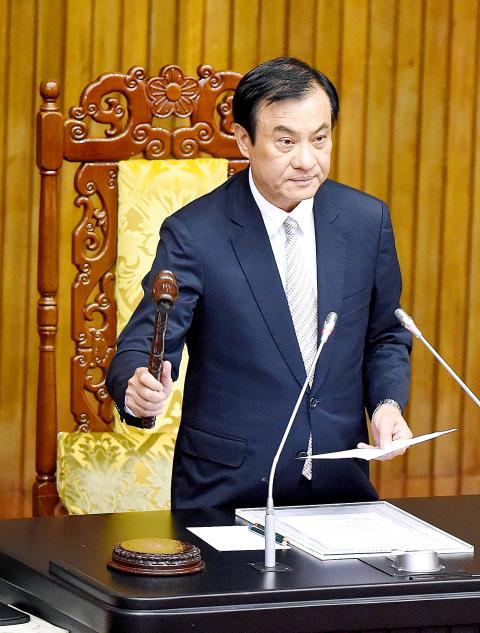Amendments to the National Security Act (國家安全法) that impose higher sentences and fines on people spying for China or other nations, and increase restrictions on retired officials visiting China were yesterday passed by the legislature.
Those found recruiting others in Taiwan under instructions from the Chinese government would be subject to at least seven years in prison and a fine of up to NT$100 million (US$3.19 million) under the amendments.
Those conducting espionage by using the Internet would also be subject to the new penalties.

Photo: Chu Pei-hsiung, Taipei Times
People employed by the military, the civil service, state-run enterprises or public-school teachers who are convicted for contravening the act would lose their pension, while those who have already retired and have received pension benefits would be required to return all the funds paid up to the date of their conviction.
Supplementary resolutions on the issues of how to define China, Macau and Hong Kong within the rubric of “hostile foreign forces,” and how to determine whether disseminated communications from people from those regions or other nations constitute a national threat are to be determined during the next legislative session, the Democratic Progressive Party and New Power Party caucuses said.
Those issues would be addressed through amendments to the Act Governing Relations Between the People of the Taiwan Area and the Mainland Area (臺灣地區與大陸地區人民關係條例), as well as the relevant communications laws, they said.
Legislative Speaker Su Jia-chyuan (蘇嘉全) yesterday morning called a cross-caucus meeting to discuss amendments to Articles 2-1 and 5-1, and the additions of Articles 2-2 and 5-2 to the National Security Act.
The biggest developments that came out of the three-hour meeting were the increase in fines and imprison sentences specified in Article 5-1 and the way China, which is considered the greatest threat to national security, is defined in Article 2-1, legislators said.
The amended law would target those found establishing, financially supporting or directing organizations for the interests of a foreign power, they said.
It would also target those found probing, leaking or transmitting documents, images, electronic files or other items related to national security, they added.
Those found guilty of the above offenses specifically to help the Chinese government would face a minimum of seven years in prison and a fine of between NT$50 million and NT$100 million, while those guilty of helping the governments of other nations would by subject to between three and 10 years in prison and a maximum fine of NT$30 million, they said, adding that attempted offenses would also be punishable under the amended act.
Those who admit to committing the offenses would receive lighter sentences or exemptions, they said.
All proceeds paid to collaborators by foreign governments would be confiscated, they said.

CHAOS: Iranians took to the streets playing celebratory music after reports of Khamenei’s death on Saturday, while mourners also gathered in Tehran yesterday Iranian Supreme Leader Ayatollah Ali Khamenei was killed in a major attack on Iran launched by Israel and the US, throwing the future of the Islamic republic into doubt and raising the risk of regional instability. Iranian state television and the state-run IRNA news agency announced the 86-year-old’s death early yesterday. US President Donald Trump said it gave Iranians their “greatest chance” to “take back” their country. The announcements came after a joint US and Israeli aerial bombardment that targeted Iranian military and governmental sites. Trump said the “heavy and pinpoint bombing” would continue through the week or as long

TRUST: The KMT said it respected the US’ timing and considerations, and hoped it would continue to honor its commitments to helping Taiwan bolster its defenses and deterrence US President Donald Trump is delaying a multibillion-dollar arms sale to Taiwan to ensure his visit to Beijing is successful, a New York Times report said. The weapons sales package has stalled in the US Department of State, the report said, citing US officials it did not identify. The White House has told agencies not to push forward ahead of Trump’s meeting with Chinese President Xi Jinping (習近平), it said. The two last month held a phone call to discuss trade and geopolitical flashpoints ahead of the summit. Xi raised the Taiwan issue and urged the US to handle arms sales to

BIG SPENDERS: Foreign investors bought the most Taiwan equities since 2005, signaling confidence that an AI boom would continue to benefit chipmakers Taiwan Semiconductor Manufacturing Co’s (TSMC, 台積電) market capitalization swelled to US$2 trillion for the first time following a 4.25 percent rally in its American depositary receipts (ADR) overnight, putting the world’s biggest contract chipmaker sixth on the list of the world’s biggest companies by market capitalization, just behind Amazon.com Inc. The site CompaniesMarketcap.com ranked TSMC ahead of Saudi Aramco and Meta Platforms Inc. The Taiwanese company’s ADRs on Tuesday surged to US$385.75 on the New York Stock Exchange, as strong demand for artificial intelligence (AI) applications led to chip supply constraints and boost revenue growth to record-breaking levels. Each TSMC ADR represents

State-run CPC Corp, Taiwan (CPC, 台灣中油) yesterday said that it had confirmed on Saturday night with its liquefied natural gas (LNG) and crude oil suppliers that shipments are proceeding as scheduled and that domestic supplies remain unaffected. The CPC yesterday announced the gasoline and diesel prices will rise by NT$0.2 and NT$0.4 per liter, respectively, starting Monday, citing Middle East tensions and blizzards in the eastern United States. CPC also iterated it has been reducing the proportion of crude oil imports from the Middle East and diversifying its supply sources in the past few years in response to geopolitical risks, expanding